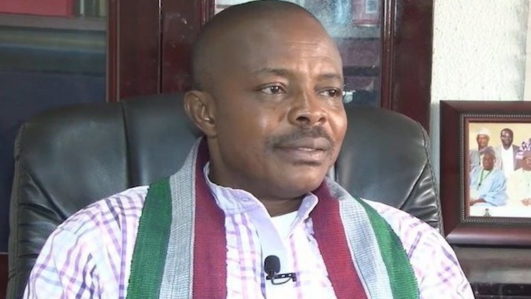Justice Inyang Ekwo of a Federal High Court in Abuja on Monday refused to nullify Regulation 127 of the Nigeria Police Force, which forbids unmarried police officers from getting pregnant.
The Regulation provides that “an unmarried woman police officer, who becomes pregnant, shall be discharged from the Force and shall not be re-enlisted except with the approval of the Inspector General of Police”.
The decision of the Court followed an action filed by Nigerian Bar Association querying the legality of the provision which, it argued, was not only in conflict with the 1999 constitution (as amended), but also amounted to discrimination against an unmarried female police officer.
Citing the case of Omolola Olajide, a female police officer that was sacked in Ekiti State on January 26, 2021, for being pregnant while unmarried, the NBA maintained that such discriminatory Regulation has also rendered many female officers childless for fear of being sacked.
The NBA said, “The male police officers and married female police officers in the Nigeria Police Force are not subjected to similar discrimination, sanction, opprobrium, and indignity.
“There are many unmarried female police officers in the NPF who, because of this discriminatory practice, cannot have or be allowed to have children because of fear of dismissal from the Police Force.
“Married female police officers are allowed to be pregnant and have children while still serving in the Police Force; they also enjoy maternity benefits.”
The Attorney-General of the Federation, Abubakar Malami (SAN), Police Service Commission, and the Nigeria Police Force were listed as defendants in the suit.
Though the other defendants did not respond to the suit, the AGF, in a counter-affidavit asked that it should be dismissed.
He contended that the Regulation the NBA complained about was in order as it was made pursuant to an extant law.
The AGF asked the plaintiffs to approach the National Assembly for an amendment if it was not comfortable with the provision.
“Fundamental human rights, as guaranteed under the 1999 Constitution of the Federal Republic of Nigeria (as amended), are not absolute.
“The Nigeria Police Act and Regulations are special creations of law. The Nigeria Police Act and Regulations provide the framework for the Police Force in maintaining peace, combating crime, protecting liberties, life and property, and other related matters.
“Lawful discrimination permits an action undertaken based on the irreversible needs of a person or the society at large. The work of law enforcement and policing is one that demands emotional stability and physical agility.
“Effective law enforcement requires the performance of essential functions which are strongly contingent upon a high level of physical fitness. Environmental conditions of policing and law enforcement can create potential conflicts between police duties and pregnancy,” the AGF said.
Delivering his judgement, Justice Ekwo upheld the submissions of the AGF.
According to him, the suit lacked merit, stressing that such unmarried female police officers were aware of the regulation before they joined the force.
He said, “Where a law or regulation of an establishment identifies gender attributes or faults and seeks to regulate the vulnerabilities capable of negatively affecting the progress of such gender, such law or regulation is a warning aforehand and cannot be said to be discriminatory.
“In my opinion, the essence of this suit is to use the provision of the 1999 Constitution, as amended, to lower the moral and professional standard of the NPF and this court will not give its imprimatur to such venture.
“It is my finding that in all that the plaintiff has posited, it has not pointed to any aspect of the regulation complained of, which violates the interest of public order or public morality, which will make it reasonably justifiable to invalidate Regulation 127 of the NPFR and I so hold.
“I find that there was no basis for this action in the first place. An unmarried woman who intends to get pregnant is not compelled to join the police force.
“Where such a woman becomes a police officer, she is bound by the regulation on pregnancy while being unmarried.
“I am unable to see any of the fundamental human rights provided in Chapter IV of the 1999 Constitution, as amended, expressly or latently meant to shield an unmarried woman police officer who becomes pregnant from being discharged from the force.
“I find that the regulation in issue, in this case, is about conduct and nothing more. I find no compelling reason for this court to disrupt the discipline of the force or interfere in the regulation of the conduct of officers of the NPF, whether male or female.
“Any person who joins the force must abide by the regulation of the force or not join the force as there is no compulsion about its membership.
“It is my opinion that Regulation 127 of the NPFR is to be seen as a code of conduct for an unmarried woman police officer and to forewarn such officer on the consequence of becoming pregnant while being unmarried in the force.
“However, the regulation provides for a remedy after such officer has been discharged from the force, by stating that such officer can be relisted with the approval of the IGP.
“The argument that this provision is discriminatory because it does not apply to male officers, in my opinion, goes beyond the bounds of reasonableness and tilts seriously towards the absurd.”
The Judge held that the onus was on the NBA to prove that the statutory instrument “is not reasonably justifiable in a democratic society and is not made in the interest of defence, public safety, public order, public morality or public health.”

 News3 years ago
News3 years ago
 Entertainment2 years ago
Entertainment2 years ago
 News3 years ago
News3 years ago
 Privacy3 years ago
Privacy3 years ago
 Sports2 years ago
Sports2 years ago
 Entertainment2 years ago
Entertainment2 years ago
 News3 years ago
News3 years ago
 Opinion3 years ago
Opinion3 years ago



